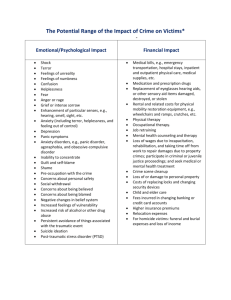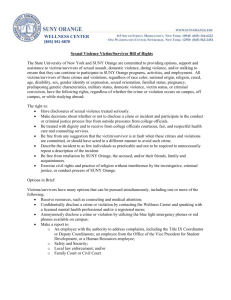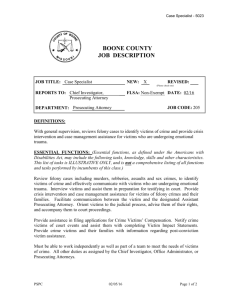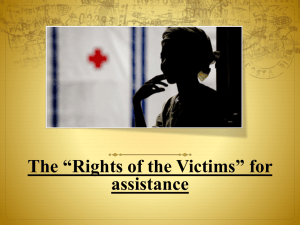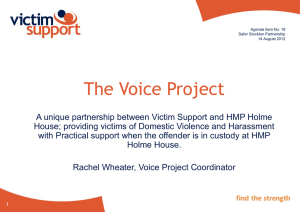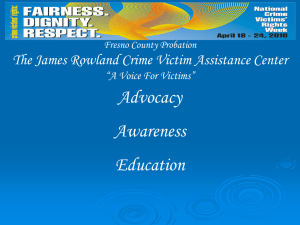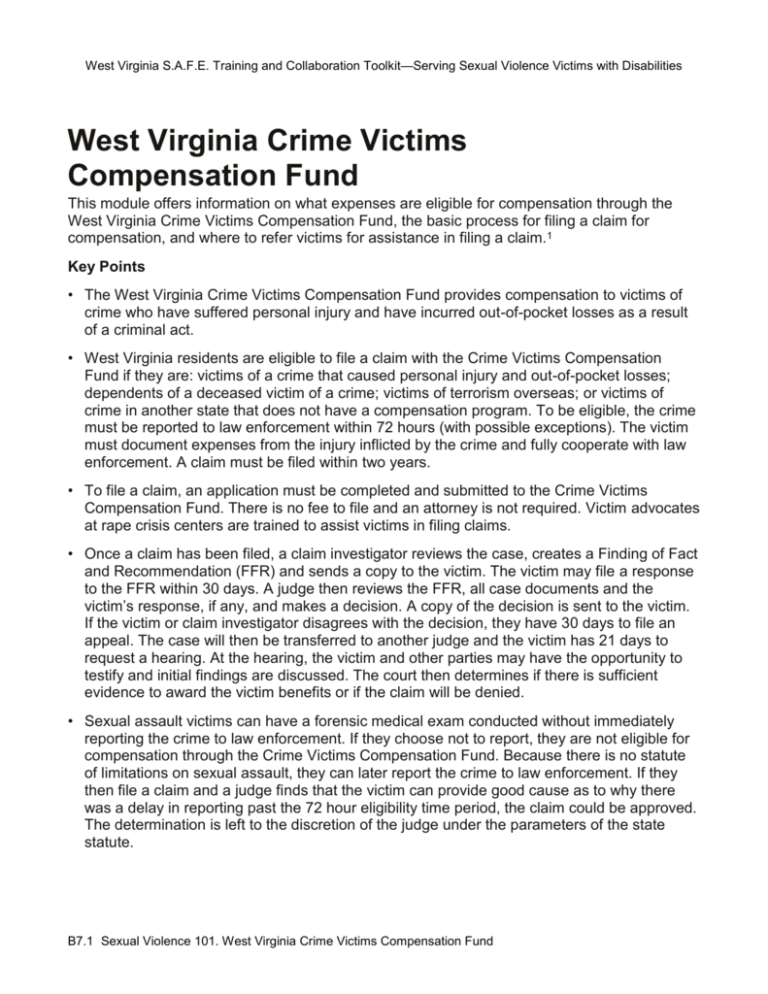
West Virginia S.A.F.E. Training and Collaboration Toolkit—Serving Sexual Violence Victims with Disabilities
West Virginia Crime Victims
Compensation Fund
This module offers information on what expenses are eligible for compensation through the
West Virginia Crime Victims Compensation Fund, the basic process for filing a claim for
compensation, and where to refer victims for assistance in filing a claim.1
Key Points
• The West Virginia Crime Victims Compensation Fund provides compensation to victims of
crime who have suffered personal injury and have incurred out-of-pocket losses as a result
of a criminal act.
• West Virginia residents are eligible to file a claim with the Crime Victims Compensation
Fund if they are: victims of a crime that caused personal injury and out-of-pocket losses;
dependents of a deceased victim of a crime; victims of terrorism overseas; or victims of
crime in another state that does not have a compensation program. To be eligible, the crime
must be reported to law enforcement within 72 hours (with possible exceptions). The victim
must document expenses from the injury inflicted by the crime and fully cooperate with law
enforcement. A claim must be filed within two years.
• To file a claim, an application must be completed and submitted to the Crime Victims
Compensation Fund. There is no fee to file and an attorney is not required. Victim advocates
at rape crisis centers are trained to assist victims in filing claims.
• Once a claim has been filed, a claim investigator reviews the case, creates a Finding of Fact
and Recommendation (FFR) and sends a copy to the victim. The victim may file a response
to the FFR within 30 days. A judge then reviews the FFR, all case documents and the
victim’s response, if any, and makes a decision. A copy of the decision is sent to the victim.
If the victim or claim investigator disagrees with the decision, they have 30 days to file an
appeal. The case will then be transferred to another judge and the victim has 21 days to
request a hearing. At the hearing, the victim and other parties may have the opportunity to
testify and initial findings are discussed. The court then determines if there is sufficient
evidence to award the victim benefits or if the claim will be denied.
• Sexual assault victims can have a forensic medical exam conducted without immediately
reporting the crime to law enforcement. If they choose not to report, they are not eligible for
compensation through the Crime Victims Compensation Fund. Because there is no statute
of limitations on sexual assault, they can later report the crime to law enforcement. If they
then file a claim and a judge finds that the victim can provide good cause as to why there
was a delay in reporting past the 72 hour eligibility time period, the claim could be approved.
The determination is left to the discretion of the judge under the parameters of the state
statute.
B7.1 Sexual Violence 101. West Virginia Crime Victims Compensation Fund
West Virginia S.A.F.E. Training and Collaboration Toolkit—Serving Sexual Violence Victims with Disabilities
B7. West Virginia Crime Victims Compensation Fund
Purpose
In addition to physical injury and trauma, sexual victimization can result in both out-of-pocket
expenses and loss of income. If the crime is reported to law enforcement, victims may be
eligible for compensation for those expenses through the West Virginia Crime Victims
Compensation Fund. In the event that a client discloses victimization, service providers need
to have a basic understanding of what expenses are eligible for compensation through the
Crime Victims Compensation Fund, the basic process for filing a claim for compensation, and
where to refer the victim for assistance in filing a claim.2 This knowledge will enable service
providers to better assist victims in accessing all possible resources to support them in the
recovery process.
Objectives
Those who complete this module will be able to:
• Explain the purpose of the West Virginia Crime Victims Compensation Fund;
• Understand how a claim is processed; and
• Provide information to victims on the Crime Victims Compensation Fund.
Preparation
Download a copy of the Crime Victims Compensation Fund Application Form through
http://www.legis.state.wv.us/Joint/victims/main.cfm.3
CORE KNOWLEDGE
What is the West Virginia Crime Victims Compensation Act?
The Crime Victims Compensation Act was created in 1981 and enacted on January 1, 1982
(WVC§14-2A). Its purpose was to establish “a fund which pays certain compensation and
medical benefits to innocent victims of crime.”
What is the West Virginia Crime Victims Compensation Fund?
The West Virginia Crime Victims Compensation Fund is a program administered by the state’s
Court of Claims. The program is funded through court fees collected from persons who have
been convicted of or plead guilty to a misdemeanor or felony (with the exception of non-moving
traffic violations). The program receives $50 per felony, $8 per misdemeanor, $10 for other
offenses, 20 percent of assessed fines in drunk-driving cases and 60 percent of the state’s
annual Victims of Crime Act grant. The Crime Victims Compensation Fund provides
compensation to innocent victims of crime who have suffered personal injury and who have
incurred out-of-pocket losses as a result of a criminal act.
B7.2 Sexual Violence 101. West Virginia Crime Victims Compensation Fund
West Virginia S.A.F.E. Training and Collaboration Toolkit—Serving Sexual Violence Victims with Disabilities
Who is eligible?
• A WV resident who is an innocent victim of a crime that caused personal injury and out-ofpocket losses
• A dependent of a deceased victim of a crime
• A WV resident who is a victim of terrorism overseas
• A resident of WV who was a victim of a crime in another state that does not have a
compensation program
Who is not eligible?
• Persons who commit a crime
• Persons who are injured while they are incarcerated
• Persons who do not cooperate with law enforcement or claim investigators from the Crime
Victims Compensation Fund
What is required?
• The crime must have been reported to law enforcement within 72 hours.
• The victim must have documented expenses from the personal injury inflicted by the crime.
• The victim must fully cooperate with law enforcement officials.
• A claim must be filed with the WV Crime Victims Compensation Fund within 2 years.
Exceptions:
o If the victim is a child, the child has until her 20th birthday to file a claim.
o Extended time for filing may be granted if there is “good cause” for filing after the specified
time frames.
What are the benefits?
The West Virginia Crime Victims Compensation Fund is a “payer of last resort,” which means it
can be accessed once all other resources have been exhausted. Other sources that victims
may access include: private insurance (medical, optical and dental), employee sick and annual
leave benefits, unemployment benefits, court ordered restitutions, life insurance over $25,000,
auto insurance, public program benefits and civil lawsuit recoveries. The Crime Victims
Compensation Fund does not cover personal property (except medically necessary items such
as eyeglasses and hearing aids) and lost wages for individuals other than the victim. Each
claim is handled on a case-by-case basis. If a victim’s expenses are paid by the Crime Victims
Compensation Fund and the victim later receives compensation from another source, the
victim is responsible for notifying the Crime Victims Compensation Fund and may be obligated
to repay amounts for which it was later determined she was not eligible.
B7.3 Sexual Violence 101. West Virginia Crime Victims Compensation Fund
West Virginia S.A.F.E. Training and Collaboration Toolkit—Serving Sexual Violence Victims with Disabilities
Maximum awards:
• $25,000 in personal injury cases
• $50,000 in death cases, which includes $7,000 for funeral/burial
• $100,000 in permanent disability cases (in addition to the $25,000)
Compensable expenses:
• Medical expenses
• Mental health counseling
• Mental health counseling for secondary victims up to $1,000
• Lost earnings
• Funeral/burial costs up to $7,000
• Relocation up to $1,000
• Travel to a medical treatment facility, to attend criminal proceedings or to return a minor
from out-of-state or out-of-country
• Crime-scene cleanup (landlords)
• Rehabilitation
• Attorney fees (public defender rates)
• Replacement services, to do what victims would normally do themselves but no longer can
because of the crime. (Examples: A victim owned a store and worked 60 hours per week.
Due to his injury, he cannot work and has to hire someone to complete the work he did in
those 60 hours. The Crime Victims Compensation Fund could pay for his replacement. If a
victim was not able to care for herself because of a crime-related injury, the Crime Victims
Compensation Fund could pay the costs of an in-home nurse. Services can be paid until the
maximum dollar amount set for this category is reached.)
Test Your Knowledge on Crime Victims Compensation Fund Eligibility
1. A 23-year-old woman with no health insurance was sexually assaulted in her home. She is
receiving therapy and was prescribed an antidepressant medication for PTSD (posttraumatic stress disorder). Could she be eligible for benefits to cover the costs of therapy
and medication?
2. A 50-year-old woman who is legally blind was sexually assaulted and, as a result, her
eyeglasses were broken. Her vision insurance will only cover 50 percent of the total cost to
replace her eyeglasses. Could she be eligible for benefits?
3. If a 5-year-old was present when his mother was raped and he is now suffering from anxiety
due to the traumatic incident, could he be eligible for mental health benefits?
Answers: “Yes” to all. However, these cases are dependent upon the crime having been
B7.4 Sexual Violence 101. West Virginia Crime Victims Compensation Fund
West Virginia S.A.F.E. Training and Collaboration Toolkit—Serving Sexual Violence Victims with Disabilities
reported to law enforcement and eligibility status subject to individual case findings by the
Crime Victims Compensation Fund.
How do you file a claim?
There is no fee to file a claim and an attorney is not required. Victim advocates at rape crisis
centers are trained to assist victims in filing claims. However, if a victim seeks the services of
an attorney and the claim is approved, reasonable attorney fees can be paid by the Crime
Victims Compensation Fund.
If a victim is uncertain about the eligibility of any aspect of a claim, additional information may
be obtained by calling the West Virginia Crime Victims Compensation Fund. An application can
be downloaded through http://www.legis.state.wv.us/Joint/victims/main.cfm or is available at
the local prosecuting attorney’s office. Below is the related contact information:
WV Crime Victims Compensation Fund
1900 Kanawha Blvd. East, Room W-334, Charleston, WV 26305-0610
Phone: 304-347-4850, 877-562-6878 (in state)
Email: ctclaims@mail.wvnet.edu
How is the claim processed?
Once a claim has been filed, the Crime Victims Compensation Fund assigns a claim
investigator to review the case. Based on the information gathered during the investigation, the
claim investigator files a “Finding of Fact and Recommendation,” or FFR, and a copy is sent to
the victim. The victim may file a response to the FFR within 30 days. One of the state’s three
Court of Claims’ judges then will review the FFR, all file documents, and the victim’s response,
if any. The judge will then make a decision and a copy of the order will be sent to the victim. If
the victim or claim investigator disagrees with the decision rendered by the judge from the
Court of Claims, they have 30 days to file an appeal. The case will then be transferred to
another judge and the victim has 21 days to request a hearing. When scheduling a hearing
date, the judge will make every effort to accommodate the victim by choosing a location that is
local and convenient. At the hearing, the victim and other parties may have the opportunity to
testify and the initial findings will be discussed. The court will determine if there is sufficient
evidence to award the victim benefits or if the claim will be denied.
Are there special eligibility concerns for sexual assault victims?
Sexual assault victims can face unique circumstances regarding eligibility for the Crime Victims
Compensation Fund. They can have a forensic medical exam conducted without reporting the
crime to law enforcement. Having a forensic medical exam conducted does not establish that a
crime occurred. Therefore a victim may not be eligible for compensation through the Crime
Victims Compensation Fund unless the crime is reported to law enforcement. However, since
there is no statute of limitations regarding sexual assault, a victim could later report the crime
to law enforcement. If the Court of Claims’ judge finds that the victim can provide good cause
as to why there was a delay in reporting the crime past the 72 hour eligibility time period, the
claim could be approved. The determination is left to the discretion of the judge under the
parameters of the state statute. (See Sexual Violence 101. West Virginia Laws on Sexual
B7.5 Sexual Violence 101. West Virginia Crime Victims Compensation Fund
West Virginia S.A.F.E. Training and Collaboration Toolkit—Serving Sexual Violence Victims with Disabilities
Assault and Abuse and Sexual Violence 101. Sexual Assault Forensic Medical Examination.)
Test Your Knowledge
Refer to the pages in this module as indicated to find the answer to each question.
1. What agency administers the West Virginia Crime Victims Compensation Fund? How is it
funded? See page B7.2.
2. What are the eligibility criteria to file a claim with the Fund? See page B7.3.
3. How many years after the crime occurred can a claim be filed? See page B7.3.
4. What expenses are eligible for reimbursement? What are the maximum awards? See page
B7.4.
5. Is there a fee to file a claim? See page B7.5.
6. Who can assist victims in filing claims? Is an attorney needed to file? See page B7.5.
7. Once a claim is filed, what is the process for making a decision? What happens if the victim
or claim investigator disagrees with the decision? See page B7.5.
8. Are there exceptions for sexual assault victims to the standard time period in which crimes
must be reported to be eligible for compensation? See page B7. 5.
Project partners welcome the non-commercial use of this module to increase knowledge about serving sexual violence victims with disabilities
in any community, and adaptation for use in other states and communities as needed, without the need for permission. We do request that any
material used from this module be credited to the West Virginia Sexual Assault Free Environment (WV S.A.F.E.) project, a partnership of the
West Virginia Foundation for Rape Information and Services, the Northern West Virginia Center for Independent Living and the West Virginia
Department of Health and Human Resources (2010). Questions about the project should be directed to the West Virginia Foundation for Rape
Information and Services at www.fris.org.
Funding was provided by Grant No. 2006-FW-AX-K001 awarded by the Office on Violence Against Women, U.S. Department of Justice. The
opinions, findings, conclusions and recommendations expressed in this module are those of the authors and do not necessarily reflect the
views of the U.S. Department of Justice, Office on Violence Against Women.
agencies refer to the persons they serve as “clients,” “consumers” and “victims.” For convenience, the
terms “victims” and “clients” are primarily used in this module. Also note that the terms “sexual violence” and
“sexual assault” generally are used in this module to encompass sexual assault, sexual abuse and other forms of
sexual violence.
2Although males and females are both victimized by sexual violence, most reported and unreported cases are
females (see endnotes in the Toolkit User’s Guide for a full citation). Therefore, in this module, victims may be
referred to as female and examples provided often have female victims.
3Note that online documents referenced in this module were available at the links provided at the time the module
was written. It is suggested you check the sites for any updates or changes. If you experience difficulty accessing
the documents via the links, another option for locating documents is doing a web search using titles.
1Partnering
B7.6 Sexual Violence 101. West Virginia Crime Victims Compensation Fund

